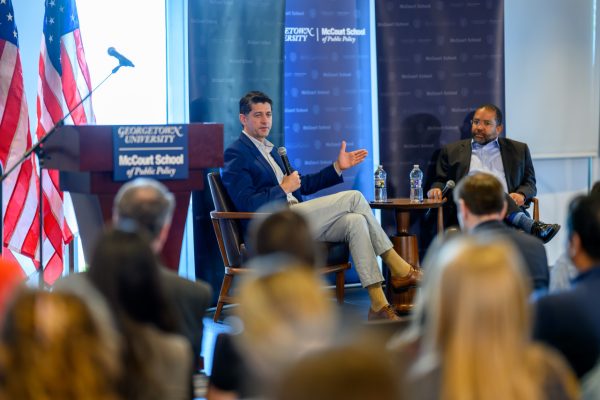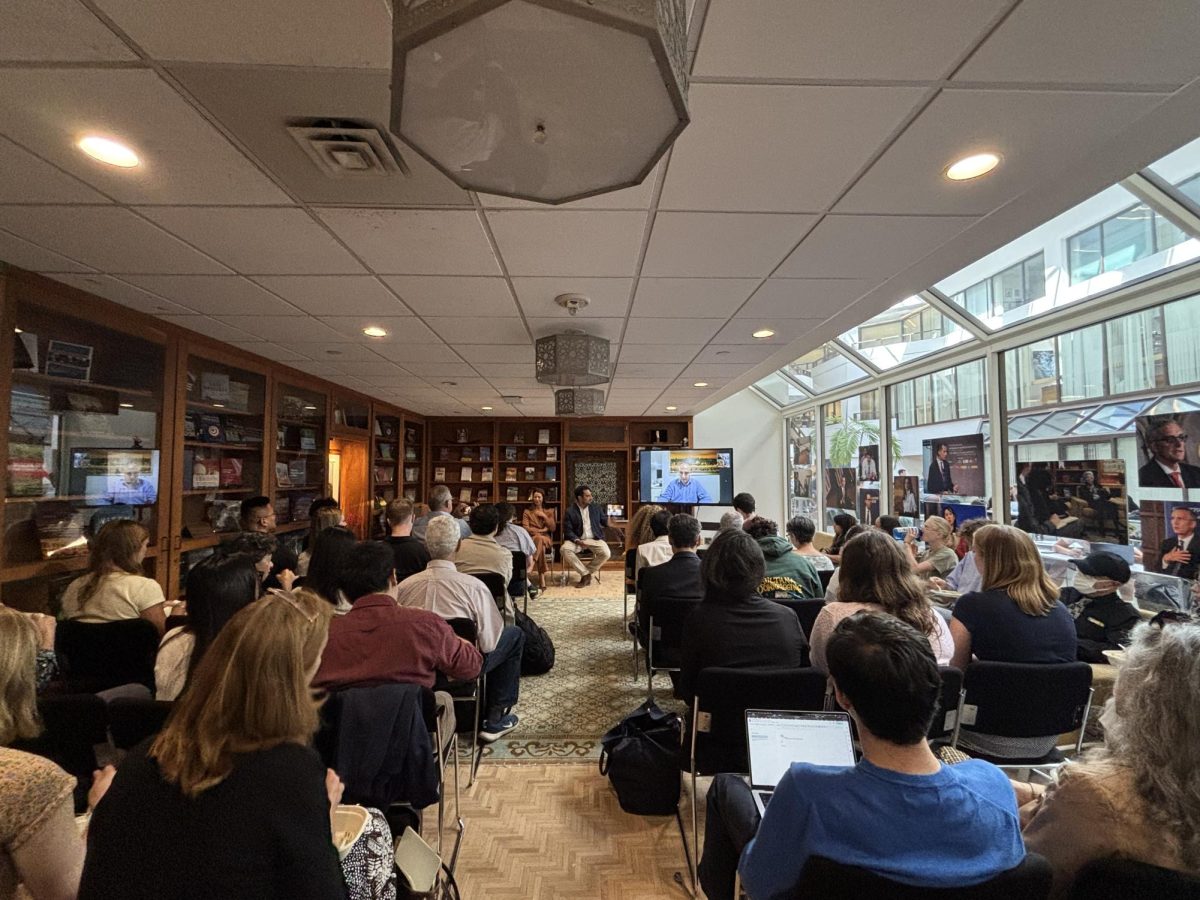Former Speaker of the U.S. House of Representatives Paul Ryan (R-WI) argued against high federal spending at a Georgetown University McCourt School of Public Policy event April 23.
Ryan criticized government spending on social services, expressed worry about rising national debt and claimed the Republican Party is shifting from fiscal conservatism to populism during the event at the Capitol Campus. The Georgetown Institute of Politics and Public Service (GU Politics), which studies national and local politics, hosted the event, which was moderated by Jonathan Burks (SFS ’99), a former GU Politics fellow and executive vice president of the Bipartisan Policy Center.
Ryan said entitlement programs, which include Social Security, Medicare and Medicaid, are no longer viable as the share of people older than 65 increases in the United States.
“The problem with this is that these programs were basically designed for the 20th century and structured in a way that is proving unsustainable in the 21st century,” Ryan said at the event.
“These programs are driving us to a debt crisis, to the point where the programs themselves will be unraveled,” Ryan added. “They will disintegrate, in that they will go bankrupt.”
Ryan said the government should phase out Social Security, allowing Baby Boomers who are 60 years old and older to continue receiving benefits, while everyone born in or after Generation X (from 1965 onward) will have their benefits scaled back or eliminated.
“Generation X on, down, is where you’re going to have to say, ‘These programs are going to look a little different than they do now,’ because they’re just not sustainable,” Ryan said.

When the Social Security Act was passed in 1935, life expectancy in the United States was 61 years, according to researchers at the University of California, Berkeley. With life expectancy now exceeding 78 years, the program’s costs are increasing. According to the Center on Budget and Policy Priorities, a think tank analyzing federal spending, Social Security expenditures exceeded $1.5 trillion in 2024, accounting for 21% of the total budget.
Ryan said other politicians unfairly claim Social Security cuts harm Americans, which could frighten U.S. residents, noting former President Barack Obama’s attack ads during his 2012 reelection campaign.
“You will run into a demagogic wave of attacks that will make people who are on these programs think benefits are being taken away from them,” Ryan said.
“A TV ad nationwide was saying that it was like throwing grandma off a cliff,” Ryan added.
Critics of Ryan’s proposals argue cutting entitlement programs would reduce health care benefits, especially for low-income Americans. McCourt’s Center for Health Insurance Reform, a nonpartisan group researching health care policy, found entitlement programs have improved health outcomes in the United States.
Ryan called on President Donald Trump to take charge of spending cuts, saying Trump should focus on his long-term legacy over maintaining approval ratings.
“We have a president in his last term, and that’s the time to do it, when there’s someone who doesn’t have to face voters again, who’s looking for legacy,” Ryan said. “And what better legacy than to prevent your country from having a debt crisis?”
Ryan said he is disappointed current Republican leadership is failing to make substantive budget cuts.
“The last budget we passed was in 2015, and we cut $6.4 trillion out of the budget baseline,” Ryan said. “They’re struggling right now, struggling to cut $1.5 to 2 trillion.”
Ryan said that in his experience, Republicans tend to focus on political style over policy substance.
“We have more entertainers than legislators than ever before,” Ryan said. “You look at the landscape and see nothing but populism and owning the libs or doing whatever — this is like Instagram policy.”
Ryan said the Republican Party is shunning difficult and unpopular fiscal policy conversations he led as Speaker of the House, opting to focus on issues more popular with the public.
“This sort of vacuous populism, entertainment-like quality to government in politics is not sustainable,” Ryan said. “What is needed in this country are people who are policymakers.”
Ryan encouraged attendees to participate in politics, saying young policymakers can begin addressing the nation’s fiscal challenges.
“Frankly, this is an important time to get into this,” Ryan said. “It’s a good time to be an aspiring policymaker.”
“When you come out of school, you’ll be running the country, and we’re going to need smart policy and smart people,” Ryan added.







